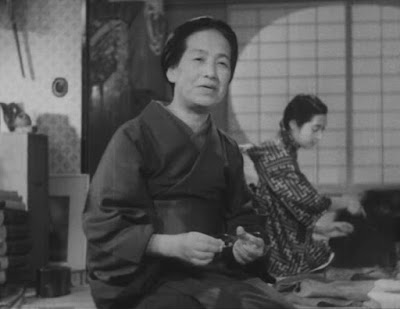Ozu's first film after two years in the Japanese army fighting on mainland China was the box-office hit TODA-KE NO KYODAI. It shows the beginning of his more focused storyelling which was to emerge eight years later with BANSHUN (Late Spring): stories of family breakups, mixing drama and gentle humour with a sad undertow.
The Toda family gather for a group photograph outside their parent's large home to celebrate the father's 69th birthday but that night he dies from a heart attack...
The family discover their father was the guarantor for massive debts accrued by a failing business. They sell the family home and possessions to pay half the debt, but cannot sell a dilapidated beach home.
It is decided that homeless Mrs Toda and youngest daughter Setsuko should move between the houses of the eldest three children.
But the women are treated as an embarrassing, unwanted burdon...
Shelf or charity shop? This is on the same dvd as the glorious TOKYO STORY so of course it's a keeper but also because it is the first film where Ozu's vision of film-making started falling into place. The film has a pace and an elegance that belies it's age and Ozu offers us his characters without judgement, just a well-observed resignation of their failings. Ozu's favourite actor Chishu Ryu is seen in a bit part as a friend of the youngest son Shojiro who is charismatically played by Shin Saburi, the first of five roles he played for Ozu. Ayako Katsuragi and Mieko Takamine are fine as the unwanted mother and daughter while Kuniko Miyake and Mitsuko Yoshikawa are hissable as the unwelcoming sister-in-law and sister of the Toda family. There is also a very nice performance from Michiko Kuwano as Setsuko's friend: sadly the actress - who had played a lead role in Ozu's WHAT DID THE LADY FORGET? in 1937 - died several years later aged only 31. The film's odd, abrupt ending was the result of Ozu realizing that he didn't have two days left to film but two hours!










No comments:
Post a Comment